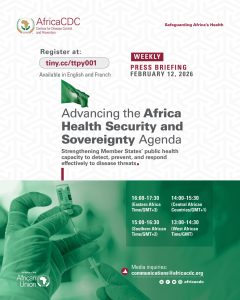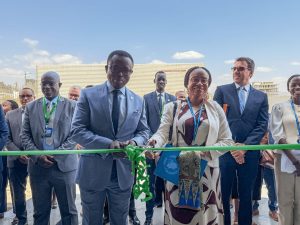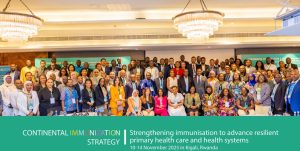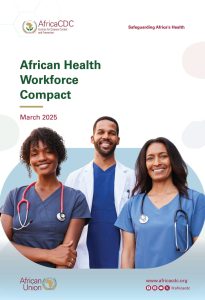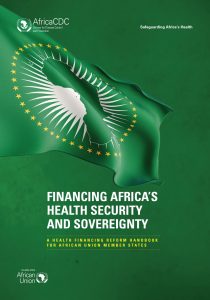Africa CDC and strategic health partners operating in Central Africa have drawn up an outline of a joint 2026–2027 roadmap to strengthen health security in the Central African region.
Central Africa, like the rest of the continent, is deeply affected by recurrent or prolonged health crises, with the emergence and re-emergence of infectious threats. These threats challenge the resilience of healthcare systems and underline the need for an integrated, multi-sectoral and proactive approach. These public health emergencies are a powerful reminder that no country can effectively and sustainably deal with cross-border health threats on its own.
“This joint planning process is much more than a technical exercise. It is a key moment to strengthen our regional public health architecture, foster the interoperability of our alert systems, promote data sharing and expertise, and facilitate more effective mobilisation of available resources,” said Dr Brice Wilfried Bicaba, Director of Africa CDC’s Regional Coordinating Centre for Central Africa (CA RCC).
Africa CDC, through its CA RCC, brought together technical and institutional representatives from regional bodies including the Commission of the Economic Community of Central African States (ECCAS) and the Organisation for Coordination in the Fight Against Endemic Diseases in Central Africa (OCEAC) of the Economic and Monetary Community of Central Africa (CEMAC), from 16 to 18 June 2025 in Equatorial Guinea.
The inaugural strategic joint planning workshop was aimed at strengthening collaboration and coordination between Africa CDC, Regional Economic Communities and health institutions to improve prevention, preparedness and response to health emergencies in Central Africa. Africa CDC and its partners also came up with a consolidated 2025 plan.
“The 2025 joint action plan will serve as an operational guide for the coming months, focusing on concrete actions to strengthen regional coordination and governance, reinforce integrated health systems and the control of high-burden diseases, enhance surveillance, data collection and early warning, as well as build national capacity in terms of networks and laboratory systems,” added Dr Bicaba.
The joint roadmap 2026–2027 lays the foundations for a structured response that is more effective, efficient, sustainable and aligned with continental and regional frameworks such as the New Public Health Order for Africa, the Africa CDC Strategic Plan 2023–2027, the Regional Strategic Plans for Preparedness and Response to Public Health Emergencies, cross-border surveillance of diseases with epidemic potential under the ‘One Health’ approach, and the ECCAS ‘One Health’ Platform for the period 2025–2029, as well as the 2023–2027 Five-Year Strategic Plan of the OCEAC.
“This roadmap reflects our collective commitment to building a community that is better prepared, more resilient and more responsive to health threats. Coordination with Africa CDC and other regional health organisations is essential if we are to achieve genuine health security in Central Africa,” said Dr Peggy Raymonde Conjugo-Batoma, Head of the Health Department of the Commission of ECCAS.
The various stakeholders have also defined a coordination and monitoring framework for the joint implementation of health initiatives in the Central African region over the period 2025–2027. The main aim of this framework is to establish an effective coordination and accountability mechanism for the implementation, monitoring and evaluation of joint regional health security activities in Central Africa, while ensuring optimum synergy between the key players.
“I welcome this initiative, which strengthens regional solidarity around our shared priorities,” said Mr Mitoha Ondo’o Ayekaba, Equatorial Guinea’s Minister of Health. “The results of your work reflect not only the richness of your contributions but also the collective commitment and strong desire to face cross-border health threats together. They are also an illustration of strengthened regional cooperation between national institutions, regional economic communities and technical partners in the interests of our populations,” said Mr Ayekaba, who is also a member of the steering committee of the Central African RCC.
“I am personally committed to overseeing the implementation of the joint roadmap and to advocating vigorously with my colleagues to secure the necessary political support,” he said.
This inaugural workshop has been hailed by the Minister of Health and Africa CDC’s partners as a model of multi-sector collaboration, mobilising the technical expertise, political priorities and resources of the various stakeholders around a common vision.
“It marks an important step in Africa CDC’s ambition to build a more robust, integrated and inclusive continental public health system that is better prepared to deal with future health emergencies,” said Dr Bicaba.
The representatives present in Malabo also recommended co-developing collaboration protocols between the various institutions, integrating Africa CDC’s Regional Coordinating Centre for Central Africa as an observer or technical member at decision-making and technical meetings of the RECs relating to public health, health emergency management and health security, and strengthening the capacities of Member States in health planning and coordination.



